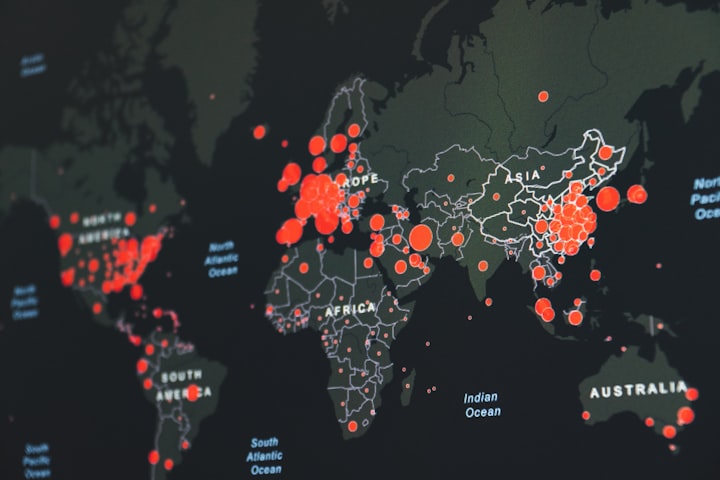Geo-Politics 101: A Beginner's Guide to Understanding the Impact of Geography on International Affairs
Understanding the Role of Geo-politics in Shaping Global Dynamics

Geo-politics is the study of the relationship between geography, culture, history, economy and the exercise of power. It encompasses the analysis of how geographical factors such as topography, climate, and natural resources affect the distribution of power and the making of foreign policy decisions.
The significance of understanding the impact of geography on international affairs stems from the fact that geography has a significant impact on a country's and region's economic, political, and social development; it can affect how countries interact and relate to one another; and it can shape how countries exert power and defend their sovereignty. Furthermore, understanding the geographical factors at work in a region can provide insights into the potential for conflicts or cooperation, as well as inform decision-making in areas such as foreign policy, military strategy, and humanitarian aid. By understanding the ways in which geography shapes politics, it becomes possible to anticipate and respond to potential challenges, develop strategic plans, and promote peace and security. Therefore, understanding the impact of geography on international affairs can help individuals, organizations and governments make better-informed decisions, and navigate the complexities of a rapidly changing world.
The role of geography in geo-politics is multifaceted, and it can be analyzed from different perspectives, such as physical geography, human geography, and historical geography.
1. Physical geography refers to the natural features of the earth's surface, such as climate, topography, and natural resources. Natural resource distribution and availability can have a significant impact on a country's economy, political stability, and foreign relations. Countries rich in oil or other strategic resources, for example, may wield greater influence in international affairs and may face competition or conflict over those resources. Climate can also impact a country's ability to support agriculture or industry, thereby influencing economic development. Topography can have an impact on a region's strategic importance as well as a country's military capabilities.
2. Human geography: The study of human use and occupation of the earth's surface is known as human geography. This includes demographics, culture, and economic activity research. Human geography can influence how countries interact with one another and wield power. Cultural differences, for example, can impact communication and cooperation between countries, while economic activity can impact trade relations. Demographics in a country's population can also influence its political stability and potential for conflict.
3. The study of the past and how it has shaped the earth's surface and human societies is referred to as historical geography. Historical geography can shed light on how past events and legacies have shaped current political and economic realities. For example, the legacy of colonisation or past territorial disputes can have an impact on current bilateral relations. Understanding a region's historical context can help you better understand current geopolitical issues and potential flashpoints.
The study of the past and how it has shaped the earth's surface and human societies is referred to as historical geography. Historical geography can shed light on how past events and legacies have shaped current political and economic realities. For example, the legacy of colonisation or past territorial disputes can have an impact on current bilateral relations. Understanding a region's historical context can help you better understand current geopolitical issues and potential flashpoints.
Power in geopolitics refers to a state's or other actor's ability to influence the behaviour of others. This can manifest itself in a variety of ways, including economic, military, and political power. Economic power, for example, can manifest as a strong currency or control over critical resources, whereas military power can manifest as a large and well-equipped armed forces. Meanwhile, political power can manifest itself in the ability to set and shape the agenda in international organisations and forums.
Sovereignty, on the other hand, refers to the idea that a state or other actor has supreme authority over a certain territory and its inhabitants. This authority can be challenged by other states or actors, but it is generally accepted as a fundamental principle of international relations. Sovereignty is closely tied to geography, as the control and ownership of land and resources is often a major factor in the exercise of power.
Geography can have a significant impact on the exercise of power and sovereignty in international affairs. For example, a state with control over a strategic waterway or resources like oil and gas may be able to exert more influence on its neighbors and the international community. Similarly, a state with a long coastline or access to important sea lanes may have an advantage in terms of trade and naval power. On the other hand, landlocked states may find it more difficult to project power and defend their sovereignty.
Geography is also important in determining state geopolitical alignment. Countries that share a border or are in the same region may have common interests and form alliances, whereas countries separated by distance or physical barriers may interact less and compete more with one another. Furthermore, natural resources, such as oil-rich countries in the Middle East, may play an important role in shaping the relationships of countries. In addition to these examples, geography can have a significant impact on the exercise of power and sovereignty in international affairs. The key is to recognise that geographic factors such as location, resources, and topography frequently shape the behaviour and interests of states and other actors, shaping the international system as a whole.
Geopolitics influences the interests and actions of states and other actors, thereby shaping international relations. As previously stated, geography shapes the behaviour and interests of states and other actors, and thus the international system as a whole. One historical example of how geo-politics has influenced international relations is the Scramble for Africa in the late 19th century. European powers partitioned and colonized the continent based on their interests in resources and strategic locations, leading to conflicts between the European powers as well as between the European powers and the indigenous populations. This period of colonialism had significant lasting impacts on Africa's political and economic development, as well as on the relationships between African countries and the rest of the world.
Another example is the Cold War between the United States and the Soviet Union, which was heavily influenced by geo-politics. The two superpowers competed for influence and control over different regions of the world, often backing rival factions in proxy wars and vying for strategic locations such as Cuba and Afghanistan. The geography also played a role by creating a dividing line in the form of the Iron Curtain, splitting Europe into capitalist west and communist east.
In current global events, the ongoing territorial and resource disputes in the South China Sea is one example of how geo-politics is influencing international relations. China, along with several other countries in the region, have laid claim to various islands and waters in the sea, which is rich in fish and minerals and also has potential for oil and gas reserves. These disputes have led to increased tensions between China and its neighbors, as well as between China and the United States, and have potential ramifications for trade and security in the region.
Similarly, geopolitics is playing an important role in the Arctic region. Climate change is opening up new opportunities for resource exploitation, shipping, and increased military activity, which is leading to rising tensions among Arctic countries as well as countries outside the region. Countries are now competing for new shipping routes and resources, potentially affecting global trade and security.
Yes, comprehending the interplay of geography, power, and sovereignty is critical for comprehending international affairs. Geography can influence state strategic and economic interests by shaping the distribution of resources and population. Economic, military, and political power can shape the distribution of influence and the actions of states. Sovereignty, or the idea that states have the right to govern themselves independently, can shape how states interact, resulting in conflict or cooperation.
In addition to these factors, there are many other elements that contribute to the complexity of international relations, such as culture, history, and demography. It is also important to note that these factors often interact with and influence one another. I would encourage you to continue exploring and learning about the field of geo-politics. There are many resources available, including books, articles, and online courses, that can provide deeper insights and help you understand the complexities of international affairs. It is also important to stay current with current events, as they provide valuable context and help to illustrate how these concepts play out in the real world.
It is also worthwhile to investigate different countries' geopolitical perspectives, as different countries have different strategic and security interests based on their geographic location, resources, and level of economic development. It's also important to remember that geopolitics is a constantly changing and adapting dynamic process.
About the Creator
Laktish Rouben
By continuing to read my blog geo-politics, you'll gain a better understanding of the forces shaping the world today. My posts provide a unique perspective on the most pressing issues and stay up to date on the latest developments.






Comments
There are no comments for this story
Be the first to respond and start the conversation.